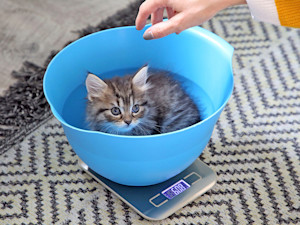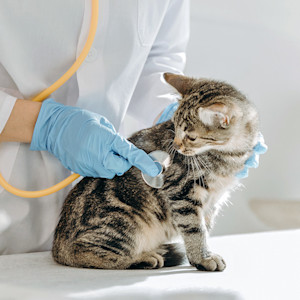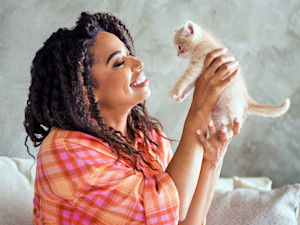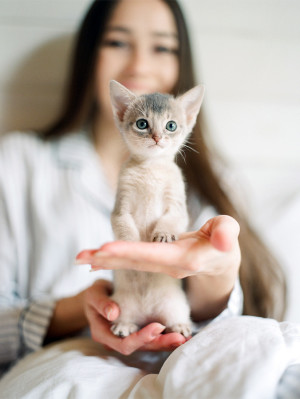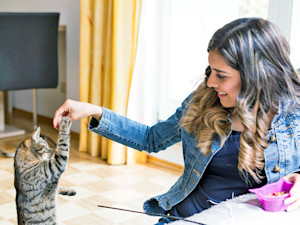Kitten Vaccine Schedule Guide: Keep Your Kitten Healthy
Want your kitty to live their best, healthiest life? Get them vaccinated.
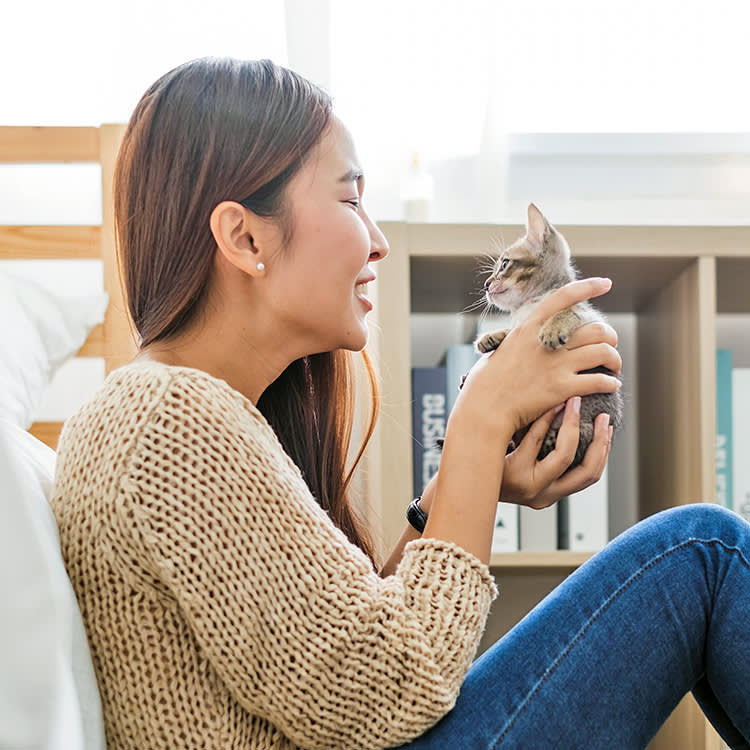
Share Article
In This Article:
The Core Vaccines for Kittens Non-Core Vaccines for Kittens Recommended Kitten Vaccine Schedule Costs of Kitten Vaccinations
Caring for a new kitten is fun, exciting, and maybe a little bit confusing. While you may understand litter box training and how to work a laser toy, a kitten’s vaccine schedule may seem completely perplexing. Below, we shed some light on the kitten vaccine schedule, so that your new kitty doesn’t miss the opportunity to get a poke that can keep them healthy down the road.
The core vaccines for kittens
Core vaccines are necessary for every kitty — no matter where they live, if their mother was vaccinated, or if they have other furry roommates. All kittens should receive vaccines for the following illnesses.
Feline herpesvirus (FHV-1)
This is a virus that’s everywhere. It is easily spread from cat to cat and causes issues in the upper respiratory tract and the eyes. Kitties with a herpesvirus infectionopens in new tab will have lots of watery or gooey discharge from their nose and eyes. They’ll also experience coughing, sneezing, as well as redness and swelling around the eyes. Though any cat can get herpesvirus, kittens and those with other health conditions are more severely affected.

Feline calicivirus (FCV)
Calicivirusopens in new tab is the worst kind of team player, often working closely with feline herpesvirus to cause respiratory and eye issues. Besides lots of discharge from the nose and eyes, calicivirus also likes to get into the mouth, causing painful ulcers or sores that can make a cat drool and not want to eat.
Feline panleukopenia (FPV)
You may hear feline panleukopeniaopens in new tab referred to as “feline distemper” or “feline parvo.” Neither name is actually accurate, because feline panleukopenia is its own nasty disease. Like parvo, FPV attacks rapidly dividing cells in the body, so it can create digestive issues and knock out white-blood-cell numbers in kittens. The virus can also cause vomiting, diarrhea, fever, and recurrent infections.
Rabies
The rabies virus can infect any mammal, including humans. It’s nearly 100 percent fatal, so why wouldn’t you want to protect your kitten? Rabies is most commonly transmitted to your cat through contact with wildlife, such as skunks or raccoons. Regardless, if you have an indoor kitty, it’s better to play it safe and still get them vaccinated against rabies.
Non-core vaccines for kittens
Your vet will decide if your kitten needs these vaccines because not every kitten is going to be exposed to the below diseases. The need for these vaccines tends to depend on your kitten’s lifestyle.
Feline leukemia virus (FLV)
If your kitten is going to venture outdoors to mingle with other cats, or if they have a furry housemate who does, your vet will likely recommend a feline leukemiaopens in new tab vaccine. If caught, this can be a nasty disease that is very contagious and stick with a cat for life causing immune suppression and even cancer. Some vets may consider this a core vaccine for kittens regardless of lifestyle.
Feline immunodeficiency virus (FIV)
Similar to HIV in humans, the feline immunodeficiencyopens in new tab virus attacks a cat’s immune system, causing them to have recurrent infections. There is no cure or current vaccine for FIV. Instead, your best bet to prevent an FIV infection is to keep your cat from fighting with, or getting bitten by, potential carriers.
Bordetella
Feline bordetellosis can cause kennel cough. (Although it’s often thought of as a canine disease, cats can get it, too.) If contracted, a cat may develop a hacking cough, fever, nasal discharge, and lethargy. The Bordetella vaccine can help prevent infections and is reserved mainly for cats who are boarded or groomed regularly, in places where they could be in close contact with a lot of other cats.
Chlamydia
Chlamydia, caused by Chlamydophila felis, can create some of the same issues seen with respiratory viruses — sneezing, alongside runny eyes and noses. Cats aren’t routinely vaccinated against chlamydia. The vaccine is mainly used when there is an outbreak (to prevent it from spreading), or if a cat has a lot of contact with other cats.
Recommended kitten vaccine schedule
Age six to eight weeks
Vaccinations shouldn’t start until a kitten is at least six weeks of age. Any earlier, and it’s likely that the antibodies a kitten receives from their mother will override it. So, somewhere in that six-to-eight-week mark, you’ll want to get your kitten started with a combo shot of FCV, FHV-1, and FPV.
Age nine to 12 weeks
If your kitten received their first vaccines in the six-to-eight-week category, now’s the time for a second round of the FCV, FHV-1, and FPV vaccine (aka a booster). Your vet may also recommend starting the FLV series, even if your kitty never strays outside.
Note: If your kitten never received their first round of vaccines, it’s not too late to start.
Age 12 to 16 weeks
If your kitten has had two rounds of their FCV, FHV-1, FPV combo, now’s the time for their third shot. If your kitten has already had three rounds of vaccinations (with the last at 16 weeks), they’re all done with that one for now.
Meanwhile, a second booster can be given for FLV, and the rabies shot can be administered.
Booster schedule
Once your little one has had three rounds of the FCV, FHV-1, and FPV vaccines (the last at 16 weeks), they won’t need a booster for another year. From there, your now-adult cat will need boosters for all of the above every one to three years, depending on the vaccine and their lifestyle.
Post-vaccination care for kittens
Kittens are normally little balls of energy interrupted by short cat naps. However, getting their vaccinations may change that momentarily. Kittens may be a little sleepier and a little less playful following their shots. They may have a bit of a sore spot at the injection site, and some even run a low-grade fever for a day or two. That’s all to be expected — so give them a little downtime and lots of affection.
If your kitten is acting really lethargic, not eating, or running a high fever, consult your veterinarian.
Costs of kitten vaccinations
The cost of kitten vaccines varies by location and which vaccine your kitten is receiving. But on average, you will probably pay anywhere from $50 to $200 each time your kitten sees the vet for a vaccine.
Bottom line
Getting your kitten vaccinated is an important part of keeping them healthy throughout their whole life.
The core vaccines — FCV, FHV-1, FPV, and rabies — are recommended for every kitten everywhere.
Most kittens start vaccinations at six to eight weeks of age with boosters every three to four weeks. Talk to your veterinarian about which schedule is right for your kitten.
References
“Core Vaccines for Pet Cats.” American Animal Hospital Association. 13 Aug 2020. https://www.aaha.org/resources/2020-aahaaafp-feline-vaccination-guidelines/core-vaccines-for-pet-cats/opens in new tab.
“Feline Calicivirus.” Cornell University College of Veterinary Medicine Baker Institute for Animal Health. https://www.vet.cornell.edu/departments-centers-and-institutes/baker-institute/research-baker-institute/feline-calicivirusopens in new tab.
“Feline Herpesvirus Infection: ABCD Guidelines on Prevention and Management.” Journal of Feline Medicine and Surgery. 1 Jul 2009. https://pmc.ncbi.nlm.nih.gov/articles/PMC7129359/opens in new tab.
“Feline Immunodeficiency Virus (FIV).” Cornell Feline Health Center. https://www.vet.cornell.edu/departments-centers-and-institutes/cornell-feline-health-center/health-information/feline-health-topics/feline-immunodeficiency-virus-fivopens in new tab.
“Feline Leukemia.” Cornell University College of Veterinary Medicine. https://www.vet.cornell.edu/departments/cornell-feline-health-center/health-information/feline-health-topics/feline-leukemia-virusopens in new tab.
“Feline Panleukopenia.” American Veterinary Medical Association. https://www.avma.org/resources-tools/pet-owners/petcare/feline-panleukopeniaopens in new tab.
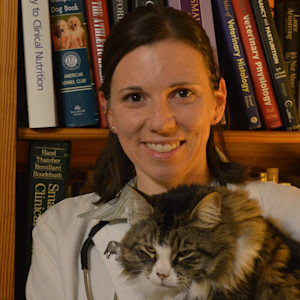
Dr. Chyrle Bonk, DVM
Dr. Chyrle Bonk has been a mixed-animal veterinarian since 2010, with a special interest in rehabilitation. When she's not practicing or writing about veterinary medicine, you may find her exploring the outdoors with her family or tending to her cows, horses, chickens, or cats and dogs.
Related articles
![Woman holding small kitten in her hands.]()
Kitten Weight Chart: Track Your Kitten’s Growth
See how they should be progressing.
What Can I Feed a Kitten?
Learn what nutrients are a must for your new little one.
![Orange cat scratching himself.]()
Best Kitten Flea and Tick Treatments
And how to treat them.
![Young woman showing gray kitten.]()
5 Development Stages You Should Know When You Get a Kitten
What to expect from birth to 16 months.
![Woman training kitten at home.]()
How to Train a Kitten
Yes, it’s possible.

